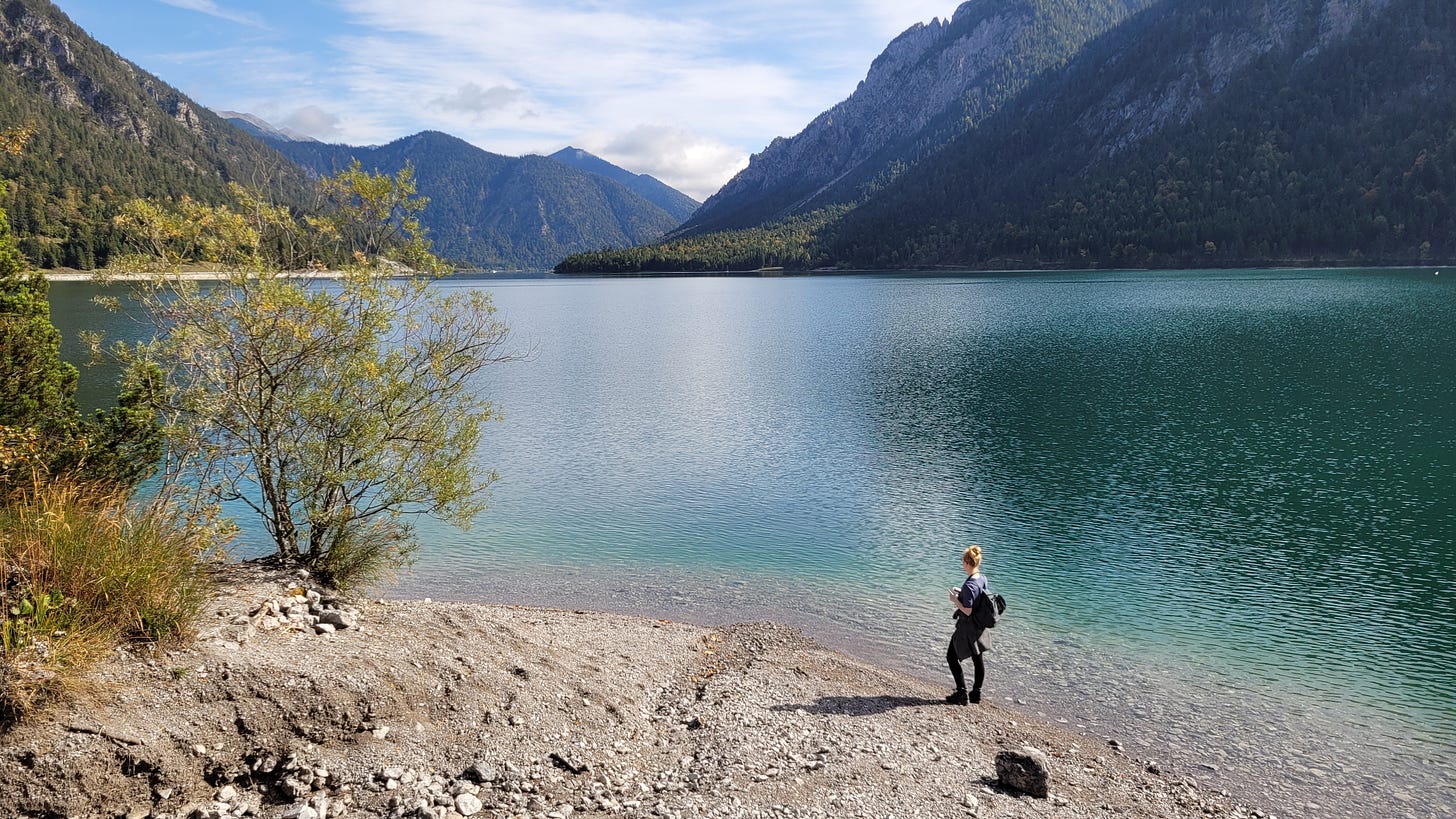🌱🤖 The First Sustainable Generation / US Bill AI footprint / Rights for Nature?
In Search of Regenerative Intelligence #5
A few months ago, I received an email from someone@dep.nasa.gov. It read something along the lines of: "I've read your book, seen your stage presence online, and would like to invite you to speak at our Aerospace event." How awesome is that! After exchanging emails and making preparations, I arrived at the five-day conference last week. I discussed our book, Real Fake, and our recent research, previews of which you'll find in this newsletter and which will be part of our next book, Real Smart.






The week was one big beautiful, intense rollercoaster. I continuously switched between fighting my nerves, having fun meeting people, being intimidated by paper presentations from all these PhDs from NASA & Caltech, and enjoying and embracing the pressure to elevate my story to the next level. What an amazing time; I came back charged with inspiration, new energy, and motivation to finish our next book.
So, it's with great enthusiasm that I present to you once again three new clues I found in my quest for Regenerative Intelligence. All are easy to digest, but if you'd like, you could chew on them for days or weeks, and they would still bring up new questions. That's a golden combo. Let them circulate in your mind and ponder… Each of the following three will be a small step towards breathing life into the concept of "Regenerative Intelligence."
1) The First Sustainable Generation
Human Intelligence
I’m reading the book Not the End of the World by Dr. Hannah Ritchie, Lead Researcher at the highly influential data site Our World in Data. In 2022, Ritchie was named Scotland’s Youth Climate Champion and New Scientist called her “The woman who gave COVID-19 data to the world.”
The tone of voice in her book is down-to-earth, based on statistics, with a deliberately optimistic outlook. We could be the first generation to build a sustainable planet! This is a sharp contrast to a group of climate activists from Germany, Italy, and Austria who call themselves De Letzte Generation. They consider themselves to be the last generation before tipping points in the earth's climate system would be reached.
Ritchie's positive outlook is a powerful, statistics-based voice that fills a void in a choir of mostly pessimistic warning signals. Both perspectives are needed, but in my opinion, most positive outlooks sounded naive and were based on a simple greenification of current affairs—sounds good, doesn’t work in practice. Ritchie goes deeper and explains clearly how much foundational (re)work is needed. But it can be done!
If you don’t want to read the book, I’d recommend watching this TED Talk or listening to one of the many podcasts she has done. E.g. this one with Bill Gates.
2) US Bill AI footprint
Artificial Intelligence
In a recent piece by Kate Crawford titled "Generative AI is guzzling water and energy" Crawford discusses the growing concerns regarding the ecological footprint of generative AI technologies. E.g. ChatGPT uses the same amount of energy as 33,000 homes, and becoming a competitor for water during dry periods. See her article in Nature or my previous newsletters for more comparisons and papers. A just warning, but nothing new so far. What was new to me is that U.S. lawmakers are beginning to pay attention. Crawford states:
”On 1 February, US Democrats led by Senator Ed Markey of Massachu- setts introduced the Artificial Intelligence Environmental Impacts Act of 2024. The bill directs the National Institute for Standards and Technology to collaborate with academia, industry and civil society to establish standards for assessing AI’s environmental impact, and to create a voluntary reporting framework for AI developers and operators. Whether the legislation will pass remains uncertain.”
If the legislation passes, it's still about voluntary reporting. Crawford is therefore pleading for more to be done. Especially since the war on chips has started and 'we ain't seen nothing yet.' NVIDIA's stock went through the roof, and Sam Altman began gathering trillions of dollars (that's thousands of billions) to reshape the chip industry. AI's footprint will increase tremendously, and mining the rare earth materials and powering and cooling down all these chips will take a toll.
It would be an enormous leap if we design chips and AI models in a more sustainable way as soon as possible. I bet in 10 years, "Green by design" or something similar will be the standard. Just like "Security by Design" is now normal when developing new IT systems. Or like thinking about ethical implications from the very start of a design process is starting to become a normal practice (Google's Gemini, the overly woke AI image generator, showed it's still hard to get it right from the start, but they definitely tried.) Anyway, how long should we wait before "Green by Design" becomes the new industry standard?
Sources:
Kate Crawford (22 February 2024), World view - Generative AI is guzzling water and energy. Nature.
The US Bill: Senator Ed Markey - Artificial Intelligence Environmental Impacts Act of 2024
3) Rights for Nature?
Natural Intelligence
Giving nature fundamental rights is the fastest-growing legal movement of the 21st century. There are already great examples out there, challenging conventional thinking. Today, New Zealand's Whanganui River is considered a person under domestic law. This river can act as a person in a court of law; it has legal standing and the proces is based on the guardianship of children. Thus, the river is assigned human guardians who advocate for its rights. Ecuador has granted rights to Pachamama (Mother Nature). People can file lawsuits on behalf of Mother Nature, and they have done so for sharks, birds, nature parks, and rivers.
It’s a big shift in our thinking, logically there is resistance and critique. A British government official from the environment department has told the UN that the UK government can never accept that nature or Mother Earth has rights: “The UK’s firm position is that rights can only be held by legal entities with a legal personality. We do not accept that rights can be applied to nature or Mother Earth,” the delegate said. “While we recognise that others do, it is a fundamental principle for the UK and one from which we cannot deviate.”
I'm curious to see how this will play out. At the very least, it reminds us that we are not alone on this planet. If this movement continues to grow, it will give a strong voice to nature.
That’s it for now. Wish you the best adventures outside, thought-provoking questions and exciting discoveries. If you haven’t subscribed yet; press the button!





